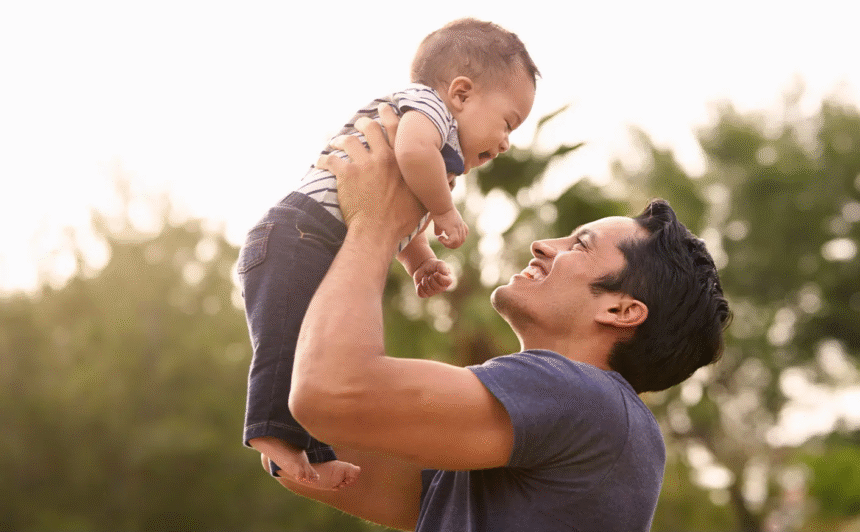Becoming a dad for the first time is one of the most exciting, challenging, and rewarding experiences in life. You’re about to step into a role that will change your world in the best possible way. But let’s be honest—being a first-time father can also feel overwhelming. Questions, doubts, and fears are all part of the journey.
This guide is here to offer real, practical parenting advice for first-time fathers, covering everything from emotional bonding to diaper changes and building confidence in your new role.
1. Embrace the Learning Curve
You’re not expected to know everything from day one. Being a dad is a skill—one that’s learned through experience, patience, and being present. Don’t be too hard on yourself. You’ll make mistakes, and that’s okay.
Start with the basics:
- Learn how to change a diaper.
- Practice holding and calming your baby.
- Help with feedings (even if it’s bottle feeding or supporting your partner with breastfeeding).
The more involved you are, the faster you’ll grow in confidence.
2. Support Your Partner Actively
Your partner is also navigating the physical and emotional challenges of new parenthood. Be her teammate, not just an observer.
Here’s how you can help:
- Attend prenatal appointments when possible.
- Be involved in daily tasks like cooking, cleaning, and baby care.
- Offer emotional support—listen without trying to “fix” everything.
A strong co-parenting partnership lays the foundation for a healthy family dynamic.
3. Create Bonding Moments with Your Baby
Many new dads worry they won’t bond with the baby as deeply as the mother does. But bonding isn’t automatic—it’s something you build with time, love, and consistent interaction.
Simple bonding activities:
- Talk to your baby, even if they can’t respond yet.
- Hold them skin-to-skin.
- Read or sing to them daily.
- Take over nighttime rocking or walk them in a stroller.
Even short moments of one-on-one time add up and create a strong emotional connection.
4. Learn Baby’s Cues and Routines
In the beginning, babies communicate mostly through crying. Over time, you’ll learn to recognize their different cries and signals. Is it a hunger cry? Are they sleepy, wet, or overstimulated?
Some tips:
- Keep a feeding and sleeping log (many parenting apps can help).
- Watch for signs of tiredness like yawning, rubbing eyes, or fussiness.
- Pay attention to what soothes your baby—white noise, swaddling, or a pacifier.
Knowing these things will make you feel more in control and able to respond calmly.
5. Practice Patience and Presence
Patience is your best friend in parenting. Babies are unpredictable—some days will feel like a breeze, while others will test every nerve.
Try to:
- Stay calm during crying spells or sleepless nights.
- Avoid distractions like phones during baby time.
- Be present. Your baby doesn’t need perfection—just your love and attention.
Even when you’re tired, remind yourself: this phase won’t last forever, and you’re doing a great job
6. Take Care of Yourself Too
It’s easy to lose yourself in the whirlwind of new fatherhood. But your well-being matters just as much.
Self-care tips:
- Get rest when you can—even 20-minute naps help.
- Eat nutritious meals and drink water.
- Talk to friends, especially other dads.
- Don’t hesitate to seek mental health support if you’re feeling overwhelmed or anxious.
A healthy dad is a better dad. Taking care of yourself helps you show up fully for your family.
7. Don’t Compare Yourself to Others
Social media can create unrealistic images of “perfect dads.” The truth is, everyone struggles. Every baby is different, every parent is different, and every journey is unique.
Focus on:
- Being the best version of yourself as a father.
- Learning and growing every day.
- Celebrating small wins (like a successful diaper change or calming a fussy baby).
Your presence, effort, and love matter far more than perfection.
8. Enjoy the Moments—They Go Fast
The early months are tiring, but they’re also filled with precious firsts: first smile, first coo, first time your baby grabs your finger.
Take time to:
- Record memories through pictures or a journal.
- Laugh at the chaos (yes, you will get peed on).
- Soak in the quiet moments.
One day, you’ll look back and be glad you were fully there—even when it was hard.
Frequently Asked Questions (FAQs)
1. How can I bond with my newborn as a dad?
Start small: hold your baby skin-to-skin, talk or sing to them, and be involved in daily care. Routine and physical closeness help create strong emotional connections.
2. What if I don’t feel an instant connection with my baby?
That’s completely normal. Bonding can take time for both moms and dads. Stay patient and keep spending time with your baby—it will come.
3. How do I support my partner after childbirth?
Help with household chores, share baby duties, offer emotional support, and make sure she gets rest. Show appreciation, and be present during tough moments.
4. I feel overwhelmed—what should I do?
Talk to someone you trust—your partner, friend, or a therapist. Join a parenting group or community. Remember, you don’t have to do it alone.
5. Is it normal to feel like I’m not doing enough?
Yes. Most new dads feel that way at some point. The fact that you care means you’re doing better than you think. Focus on being present, not perfect.
Conclusion: You’ve Got This
Being a first-time father comes with a steep learning curve—but you’re not alone. Every great dad starts where you are: unsure, hopeful, and eager to do right by their child. The most important thing is showing up—with love, effort, and an open heart.
You’ll grow into this role, and before you know it, you’ll be the one giving advice to a new dad wondering how to start. So breathe, trust yourself, and take it one day at a time.







